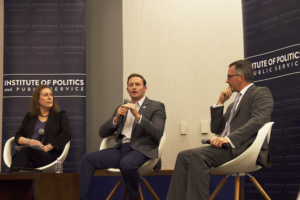
Two former Florida congressmen, Congressmen Patrick Murphy (D-Fla.) and David Jolly (R-Fla.) discussed barriers to bipartisanship in a GU Politics event Tuesday.
President Donald J. Trump has missed multiple opportunities to overcome division and facilitate bipartisan cooperation, former Congressmen David Jolly (R-Fla.) and Patrick Murphy (D-Fla.) said in an event hosted by the Georgetown Institute of Politics and Public Service on Monday.
Murphy, a current GU Politics fellow who served Florida’s 18th congressional district, a district encompassing part of Palm Beach, for two terms from 2012 to 2016, said Trump lost the opportunity to work with Democrats by starting his term with initiatives they opposed, including rescinding the Deferred Action for Childhood Arrivals immigration policy and attempting to repeal the Affordable Care Act, rather than bipartisan issues like infrastructure.
“Every Democrat has been talking about tax reform and infrastructure spending for the last years and decades,” Murphy said. “But because he started with DACA and healthcare, there might not be a single Democrat who can actually work with President Trump without facing the consequence of being labeled as a sellout.”
Jolly, who served Florida’s 13th congressional district, a coastal district adjacent to Tampa Bay, for one term from 2014 to 2016, said Trump has exacerbated divisions with frequent inflammatory rhetoric and his regular Twitter use.
“Instead of being a deal-maker, he has doubled down on this toxic rhetoric and he’s isolated people from ever working with him. Imagine if, in the last eight months, he kept his mouth shut and his fingers off Twitter. He continues to create chaos that sows the seeds of division even further,” Jolly said.
Murphy and Jolly said the root causes of today’s political gridlock include the primary election system, which forces candidates to take extreme ideological positions. Jolly said primary elections, wherein the voters are usually registered members of the candidate’s party, force candidates to appeal to their party’s more extreme elements rather than moderates.
They also blamed gridlock on gerrymandering, the process of drawing congressional districts for political advantage that often creates districts with large partisan majorities, and the constant demands of campaign fundraising, which require members to please wealthy, hardline donors with partisan promises.
Once candidates make it to Congress, Jolly said, campaign contributions from powerful lobbying groups, organizations or wealthy individuals pressure policy makers to take partisan stances.
“The reality is, all you have to do is follow along your party’s ideology, never compromise and you’ll be rewarded with re-election. But who loses? The voters who are asking, ‘Why can’t we understand all this discord and dysfunction?’” Jolly said.
Jolly also said the high cost of re-election campaigns forces members of Congress to spend large amounts of time fundraising in order to stay in office.
“Any member of Congress is going to have to raise a couple of million dollars for their own campaign. Then the party says to you: ‘On top of that, you need to raise another million dollars for the party if you want to be on this committee. So your staff is told to prioritize funding time,” Jolly said.
Murphy echoed this experience, saying Congressional leadership pressures legislators to spend the majority of their time on fundraising rather than the job voters elected them to do.
“We were telemarketers with cool titles, and every now and then we would have to get involved with policy,” Murphy said.
Both congressmen said they had experienced the effects of this partisan gridlock.
After the 2016 Orlando, Fla. Pulse nightclub shooting that killed 49 people and injured 58 others, Jolly introduced a bill which would have prohibited individuals on FBI terrorist watch lists from purchasing handguns, while also allowing them to appeal their inclusion on the list. Jolly said Democratic leadership refused to support the bill because it calculated its passage would help him in his upcoming re-election campaign.
Murphy, who said he had similar experiences, said these outcomes are not the fault of bad leaders but result from the nature of the job.
“What I realized very early on was that there were not necessarily bad people serving. They’re not dumb or lazy like we often hear, but there are structural problems ripping us apart that prohibit us from getting anything done.” Murphy said.
Nevertheless, Murphy and Jolly said they have faith in the future of the system. They urged the audience members to get involved at local levels with causes that are meaningful to them.
“I deeply believe in the institution, and I think we all should,” Jolly said. “I encourage you all to consider how you want to get involved. Hopefully one day that might include you being on the ballot as well and possibly serving in Congress and being able to fix the things Patrick and I were unable to do while we were there.”




















